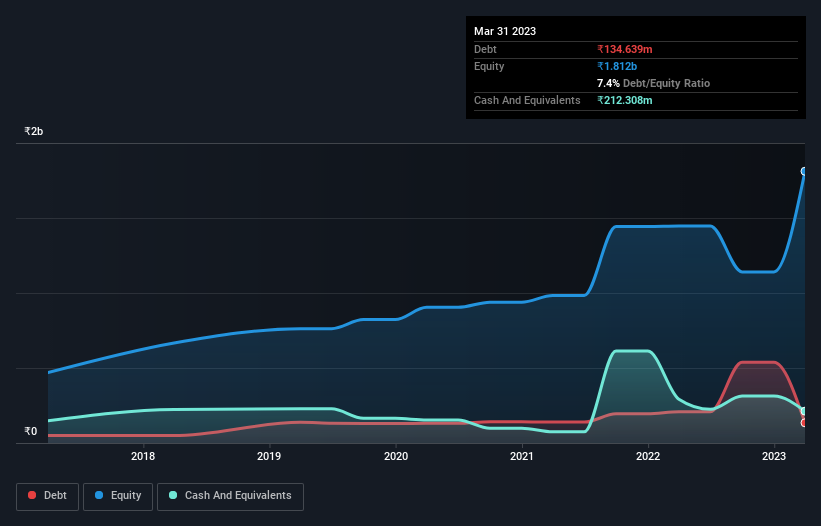Some say volatility, rather than debt, is the best way to think about risk as an investor, but Warren Buffett famously said that 'Volatility is far from synonymous with risk.' So it might be obvious that you need to consider debt, when you think about how risky any given stock is, because too much debt can sink a company. We note that Alankit Limited (NSE:ALANKIT) does have debt on its balance sheet. But the real question is whether this debt is making the company risky.
When Is Debt A Problem?
Debt is a tool to help businesses grow, but if a business is incapable of paying off its lenders, then it exists at their mercy. In the worst case scenario, a company can go bankrupt if it cannot pay its creditors. While that is not too common, we often do see indebted companies permanently diluting shareholders because lenders force them to raise capital at a distressed price. Of course, plenty of companies use debt to fund growth, without any negative consequences. When we examine debt levels, we first consider both cash and debt levels, together.
Check out our latest analysis for Alankit
How Much Debt Does Alankit Carry?
The image below, which you can click on for greater detail, shows that Alankit had debt of ₹134.6m at the end of March 2023, a reduction from ₹208.7m over a year. But on the other hand it also has ₹212.3m in cash, leading to a ₹77.7m net cash position.

A Look At Alankit's Liabilities
We can see from the most recent balance sheet that Alankit had liabilities of ₹1.02b falling due within a year, and liabilities of ₹191.7m due beyond that. On the other hand, it had cash of ₹212.3m and ₹701.9m worth of receivables due within a year. So its liabilities outweigh the sum of its cash and (near-term) receivables by ₹296.5m.
Of course, Alankit has a market capitalization of ₹2.24b, so these liabilities are probably manageable. Having said that, it's clear that we should continue to monitor its balance sheet, lest it change for the worse. Despite its noteworthy liabilities, Alankit boasts net cash, so it's fair to say it does not have a heavy debt load!
Pleasingly, Alankit is growing its EBIT faster than former Australian PM Bob Hawke downs a yard glass, boasting a 238% gain in the last twelve months. When analysing debt levels, the balance sheet is the obvious place to start. But it is Alankit's earnings that will influence how the balance sheet holds up in the future. So if you're keen to discover more about its earnings, it might be worth checking out this graph of its long term earnings trend.
Finally, a company can only pay off debt with cold hard cash, not accounting profits. While Alankit has net cash on its balance sheet, it's still worth taking a look at its ability to convert earnings before interest and tax (EBIT) to free cash flow, to help us understand how quickly it is building (or eroding) that cash balance. During the last three years, Alankit burned a lot of cash. While investors are no doubt expecting a reversal of that situation in due course, it clearly does mean its use of debt is more risky.
Summing Up
While Alankit does have more liabilities than liquid assets, it also has net cash of ₹77.7m. And it impressed us with its EBIT growth of 238% over the last year. So we are not troubled with Alankit's debt use. The balance sheet is clearly the area to focus on when you are analysing debt. However, not all investment risk resides within the balance sheet - far from it. For example Alankit has 5 warning signs (and 3 which are significant) we think you should know about.
Of course, if you're the type of investor who prefers buying stocks without the burden of debt, then don't hesitate to discover our exclusive list of net cash growth stocks, today.
New: Manage All Your Stock Portfolios in One Place
We've created the ultimate portfolio companion for stock investors, and it's free.
• Connect an unlimited number of Portfolios and see your total in one currency
• Be alerted to new Warning Signs or Risks via email or mobile
• Track the Fair Value of your stocks
Have feedback on this article? Concerned about the content? Get in touch with us directly. Alternatively, email editorial-team (at) simplywallst.com.
This article by Simply Wall St is general in nature. We provide commentary based on historical data and analyst forecasts only using an unbiased methodology and our articles are not intended to be financial advice. It does not constitute a recommendation to buy or sell any stock, and does not take account of your objectives, or your financial situation. We aim to bring you long-term focused analysis driven by fundamental data. Note that our analysis may not factor in the latest price-sensitive company announcements or qualitative material. Simply Wall St has no position in any stocks mentioned.
About NSEI:ALANKIT
Flawless balance sheet and good value.
Market Insights
Community Narratives




